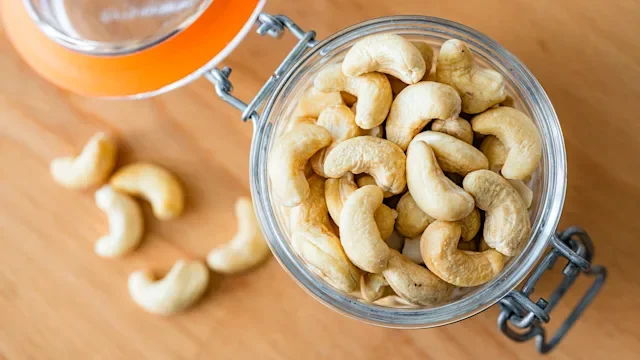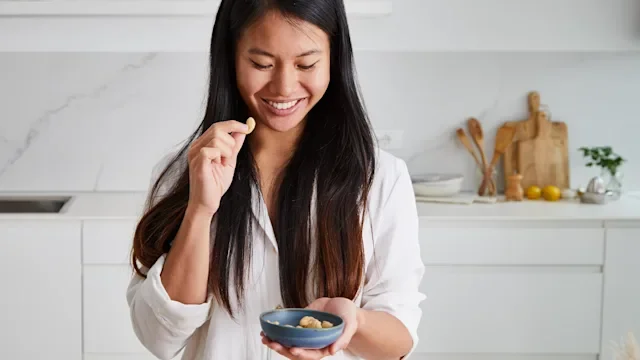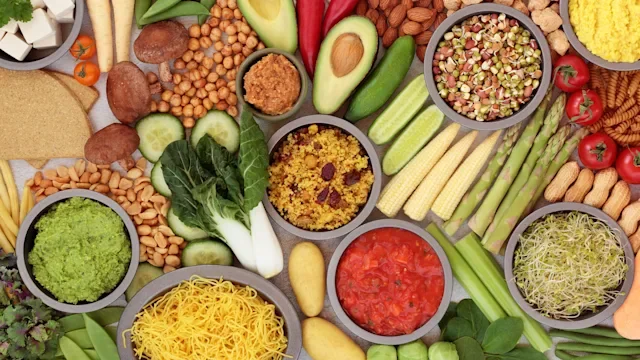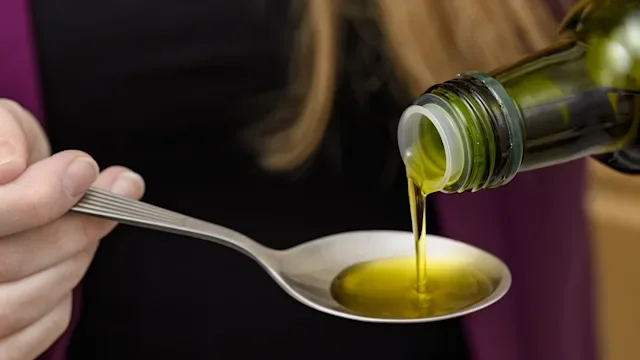Key takeaways:
Turkey contains tryptophan, an essential amino acid tied to relaxation. But there isn’t enough tryptophan in turkey to cause sleepiness.
Carbohydrates, alcohol, and large meals are bigger factors in post-meal drowsiness.
To avoid feeling sluggish after meals, pair carbohydrates with protein and vegetables. You can also try smaller portions, staying hydrated, and taking a short walk after eating.
Many of us are familiar with that post-meal sleepy feeling after big holiday feasts. It can be very hard to resist a cozy snooze on the couch with a full, satisfied stomach. People often blame the turkey. That’s because turkey contains tryptophan, an amino acid that can influence relaxation and sleep.
But does the tryptophan in turkey really make you sleepy? Or is your post-dinner slump caused by other factors? Let’s look at what the science says.
Does tryptophan make you sleepy?
In theory, tryptophan can make you sleepy. But in reality, it’s unlikely that dietary tryptophan has a measurable effect on drowsiness. Let’s take a look at what tryptophan is and how it works in your body.
Tryptophan is one of nine essential amino acids we get from food, including turkey. When you absorb tryptophan from your meal, your body converts it into serotonin, a chemical messenger in your brain that helps regulate mood and makes you feel relaxed. Serotonin is then converted into melatonin, a hormone that helps regulate your internal clock. This regulation includes telling your body when it’s time to sleep.
So tryptophan leads to the production of two chemicals that have a role in relaxation and sleep. That’s why people link it with sleepiness.
But eating turkey doesn’t actually make you sleepy. There isn’t enough tryptophan in turkey to have this effect.
A 3-oz serving of turkey has 244 mg of tryptophan. This is much lower than the dose used in studies that show an effect on sleep. Studies on tryptophan supplements typically use at least 1,000 mg (often on an empty stomach). To even get close to that amount, you’d need to eat over a pound of turkey in one sitting.
Other tryptophan foods
Turkey is probably the most famous tryptophan food. But many foods contain tryptophan. Some, like chicken and tofu, have even more tryptophan than turkey — and people eat these foods all the time without feeling drowsy afterward.
Here are some foods that contain tryptophan.
Turkey vs. chicken: Both types of poultry are rich in protein, vitamins, and minerals while being low in fat. But they also have some nutritional differences.
Carbohydrates effects on blood sugar: Carbohydrates are an important part of your diet. But different types of carbohydrates can affect your blood sugar differently.
Are potatoes good for you? Potatoes have many important nutrients, including fiber and antioxidants. There are certain ways of preparing them that may maximize their health benefits.
Type of food | Serving size | Tryptophan per serving |
Chicken | 3 oz | |
Tofu | ½ cup | |
Turkey | 3 oz | |
Salmon | 3 oz | |
Cheddar cheese | 1 oz | |
Eggs | 1 large egg | |
Cashews | 1 oz | |
Peanuts | 1 oz |
What else could be making you sleepy?
If you feel like you need a nap after holiday meals, your drowsiness is more likely caused by a combination of factors from both your meal and your environment.
Carbohydrate-heavy dishes
Many holiday meals have lots of carbohydrates, like mashed potatoes, stuffing, and pie. Eating a lot of refined carbohydrates at once can cause a spike in your blood sugar (blood glucose). This triggers your body to release insulin, a hormone produced by your pancreas. Insulin helps move glucose from your blood into your cells for energy. But this can lead to a dip in your blood sugar soon after. That “spike-and-crash” effect can sap your energy, leaving you feeling sluggish and ready for a nap.
Large portions
Eating a lot of food at once can make you drowsy. When you eat a big meal, blood is diverted away from your muscles and brain to your digestive system. This supplies oxygen and nutrients to help process your food. This redistribution of energy can leave you feeling heavy, slow, and ready to nap while your body works hard to digest.
Alcohol
A glass of wine or a cocktail might feel relaxing as you sip it. But alcohol actually decreases your alertness and energy levels.
Alcohol is a central nervous system depressant. That means it slows brain activity and enhances the effect of GABA, a chemical messenger in your brain that makes you feel calm and relaxed. This can make you feel sleepy.
As your body metabolizes the alcohol, it can also disrupt normal sleep stages. Alcohol can be especially disruptive to REM sleep, the stage of sleep where you dream. You may doze off easily but wake up feeling groggy and less refreshed.
Cozy environment
It’s not just food and drink that can make you feel sleepy. Your environment plays a role, too. After a big holiday meal, you might find yourself settled on a soft couch, in dim lighting, comfortably relaxing with family or friends.
These environmental cues can signal to your nervous system that it’s time to rest. This can decrease alertness and increase melatonin production, making it much easier to drift off.
How to avoid getting sleepy at holiday meals
If you want to enjoy a holiday meal without a post-feast nap, try these tips:
Balance your plate: Instead of filling up on one type of food, aim for a mix. Pair your carbohydrates like mashed potatoes and stuffing with protein like turkey. And add healthy fats, like a sprinkle of nuts on your salad or olive oil on roasted veggies. This mix of nutrients will help keep your blood sugar steady, so you feel full but not sluggish.
Watch portion sizes: Start with smaller portions of your favorites and take your time. If you’re still hungry after your first round, go back for more.
Limit alcohol: There are many reasons to limit alcohol, including that it causes drowsiness.
Stay hydrated: Even mild dehydration can leave you feeling more tired, especially after a big meal. Sip water throughout the day to help keep your energy up.
Take a post-meal walk: Walking after your meal aids digestion. It can also keep you from getting sleepy. It doesn’t need to be intense — a leisurely walk of 10-15 minutes can help.
Frequently asked questions
Turkey can be a good bedtime snack. There isn’t enough tryptophan in turkey to make you sleepy. But it’s a lean, easy-to-digest protein. Pairing it with a small portion of complex carbohydrates — like whole-grain crackers — can help you feel satisfied without causing a spike in blood sugar.
No, turkey doesn’t have melatonin in it. But turkey does have the amino acid tryptophan, which has a role in melatonin production. That said, your brain produces most melatonin on its own in a process influenced by light.
Tryptophan supports brain function, protects your heart, and helps your body make proteins. It also helps produce serotonin, a neurotransmitter that regulates your mood. And tryptophan plays a role in making melatonin, a hormone that helps control sleep-wake cycles.
Turkey can be a good bedtime snack. There isn’t enough tryptophan in turkey to make you sleepy. But it’s a lean, easy-to-digest protein. Pairing it with a small portion of complex carbohydrates — like whole-grain crackers — can help you feel satisfied without causing a spike in blood sugar.
No, turkey doesn’t have melatonin in it. But turkey does have the amino acid tryptophan, which has a role in melatonin production. That said, your brain produces most melatonin on its own in a process influenced by light.
Tryptophan supports brain function, protects your heart, and helps your body make proteins. It also helps produce serotonin, a neurotransmitter that regulates your mood. And tryptophan plays a role in making melatonin, a hormone that helps control sleep-wake cycles.
The bottom line
Contrary to popular belief, turkey doesn’t make you sleepy. While turkey is among the many foods that contains tryptophan, it doesn’t have enough to make you feel noticeably sleepy. The post-meal drowsiness that many people feel after big meals usually has more to do with large portions, high-carbohydrate foods, and alcohol. The key to staying alert during and after festive meals — or any meal — is to pace yourself, include a variety of nutrients on your plate, and stay hydrated.

Why trust our experts?



References
Ahmad, S. B., et al. (2023). Melatonin and health: Insights of melatonin action, biological functions, and associated disorders. Cellular and Molecular Neurobiology.
Costardi, J. V. V., et al. (2015). A review on alcohol: from the central action mechanism to chemical dependency. Revista da Associação Médica Brasileira.
Friedman, M. (2018). Analysis, nutrition, and health benefits of tryptophan. International Journal of Tryptophan Research.
Jenkins, T. A., et al. (2016). Influence of tryptophan and serotonin on mood and cognition with a possible role of the gut-brain axis. Nutrients.
Kautz, A., et al. (2024). Dietary intake of nutrients involved in serotonin and melatonin synthesis and prenatal maternal sleep quality and affective symptoms. Journal of Nutrition and Metabolism.
Kvietys, P. R. (2010). Postprandial hyperemia. The Gastrointestinal Circulation. Morgan & Claypool Life Sciences.
Mantantzis, K., et al. (2019). Sugar rush or sugar crash? A meta-analysis of carbohydrate effects on mood. Neuroscience and Biobehavioral Reviews.
My Food Data. (n.d.). Cheddar cheese.
My Food Data. (n.d.). Cooked wild Atlantic salmon.
My Food Data. (n.d.). Firm tofu.
My Food Data. (n.d.). Poached eggs.
My Food Data. (n.d.). Raw cashews.
My Food Data. (n.d.). Raw peanuts.
My Food Data. (n.d.). Roasted chicken breast.
My Food Data. (n.d.). Roasted turkey breast.
Sutanto, C. N., et al. (2022). The impact of tryptophan supplementation on sleep quality: A systematic review, meta-analysis, and meta-regression. Nutrition Reviews.
Taylor, K., et al. (2025). Adult dehydration. StatPearls.












